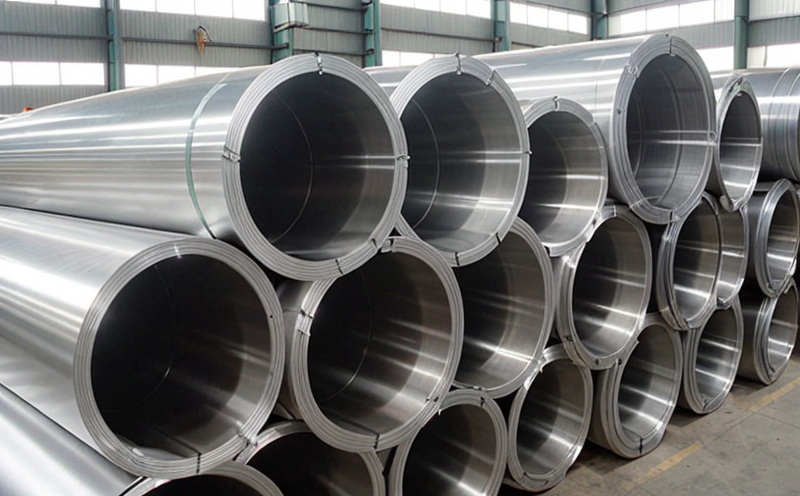ASTM D2247 Moisture Resistance Simulation Testing
The ASTM D2247 test method is a standardized procedure designed to evaluate the moisture resistance of flexible aluminum materials. This test simulates real-world conditions where materials are exposed to high humidity or water immersion, which can lead to degradation over time.
The primary purpose of this test is to ensure that aluminum materials used in marine and ship equipment withstand environmental stresses without compromising their integrity. By subjecting the material samples to controlled exposure environments, we can determine its resistance to moisture ingress and subsequent deterioration. This testing is critical for ensuring product reliability and compliance with industry standards.
Aluminum plays a crucial role in many marine applications due to its lightweight nature, corrosion resistance, and excellent thermal and electrical conductivity properties. However, the presence of water or high humidity can lead to significant issues such as galvanic corrosion, stress cracking, and reduced mechanical strength. Therefore, testing aluminum materials under controlled moisture exposure helps manufacturers identify potential weaknesses early in the product development process.
During ASTM D2247 tests, samples are exposed to a saline solution for extended periods, simulating conditions found on ships or near shorelines. The test can be conducted using either cyclic immersion (alternating between dry and wet states) or continuous immersion methods depending on specific requirements. After exposure, the specimens undergo visual inspection and mechanical testing to assess changes in properties like tensile strength, elongation at break, and impact resistance.
For accurate results, proper sample preparation is essential. Before initiating the test, all samples must be conditioned according to specified temperature and humidity conditions specified by ASTM D2247. This ensures that any initial moisture content variations are minimized so that only the effects of the simulated environment can be measured accurately.
The test apparatus used in ASTM D2247 includes immersion chambers capable of maintaining precise control over temperature, relative humidity levels, and exposure duration. These chambers ensure consistent environmental conditions throughout the testing process. Additionally, specialized fixtures may also be employed to hold specimens securely during mechanical tests conducted after exposure.
Acceptance criteria vary based on individual project specifications but generally include limits for changes in physical dimensions, electrical conductivity, weight loss, color change, and mechanical property degradation compared to unexposed controls. Compliance with these acceptance criteria indicates satisfactory performance under simulated moisture conditions.
In summary, ASTM D2247 moisture resistance simulation testing is vital for evaluating the durability of aluminum materials intended for use in maritime environments. It provides valuable insights into how these materials behave when subjected to prolonged exposure to moisture, helping manufacturers make informed decisions regarding material selection and design improvements.
Eurolab Advantages
EuroLab offers unparalleled expertise and state-of-the-art facilities for conducting ASTM D2247 tests. Our team of highly skilled professionals ensures accurate execution of each test, providing reliable data that meets or exceeds industry expectations.
- Comprehensive Laboratory Network: With multiple locations across Europe, EuroLab provides convenient access to our services regardless of your location.
- ISO/IEC 17025 Accreditation: Our laboratories are fully accredited according to international standards ensuring consistency and quality in all test results.
- Expert Staff: Our team comprises experienced scientists with deep knowledge of materials science, particularly related to marine applications. They stay updated on the latest technological advancements and best practices.
- Advanced Equipment: EuroLab invests heavily in acquiring cutting-edge testing equipment that adheres strictly to international standards like ASTM D2247. This allows us to provide precise measurements and replicate real-world conditions accurately.
- Dedicated Support: From initial consultation through final reporting, our clients receive personalized attention ensuring a smooth workflow throughout the entire testing process.
By leveraging these advantages, EuroLab guarantees that every ASTM D2247 test conducted is both precise and reliable. Our commitment to excellence ensures you get the most accurate results possible, giving your products an edge in competitive markets.
Why Choose This Test
- Comprehensive Evaluation: ASTM D2247 provides a thorough evaluation of aluminum materials' performance under simulated moisture conditions, offering comprehensive insights into their durability and reliability.
- Industry-Wide Recognition: Being an internationally recognized standard, ASTM D2247 ensures that your tests meet global quality benchmarks, enhancing the credibility of your products in international markets.
- Predictive Capability: This test helps predict long-term performance by simulating real-world conditions, allowing manufacturers to make informed decisions about material selection and design improvements early on in the process.
- Compliance Assurance: Ensuring compliance with relevant regulations and industry standards is crucial for maintaining market access. Conducting ASTM D2247 tests helps meet these requirements effectively.
- Risk Mitigation: Early identification of potential issues through this testing can help mitigate risks associated with moisture damage, thereby protecting your reputation and reducing costly recalls or repairs later on.
- Cost Efficiency: While it may seem expensive initially, avoiding failures due to poor material performance ultimately saves costs by preventing larger-scale problems down the line.
Selecting ASTM D2247 moisture resistance simulation testing not only enhances product quality but also contributes significantly towards achieving sustainable development goals within the maritime industry. By investing in this type of testing early on, companies can ensure they are meeting current and future demands while maintaining a strong competitive position globally.





